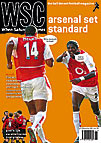 Sepp Blatter is promising Oceania automatic entry to the World Cup, again. Matthew Hall thinks this time he may actually come up with the goods
Sepp Blatter is promising Oceania automatic entry to the World Cup, again. Matthew Hall thinks this time he may actually come up with the goods
To be or not to be? That’s the question for the Oceania Football Confederation as FIFA promises the qualifying process for the 2006 World Cup will be decided in Madrid this December. The proposal, from none other than the president Sepp Blatter, is that Oceania takes the guaranteed qualifying place freed up by the decision that the holders will no longer qualify automatically for future World Cups.